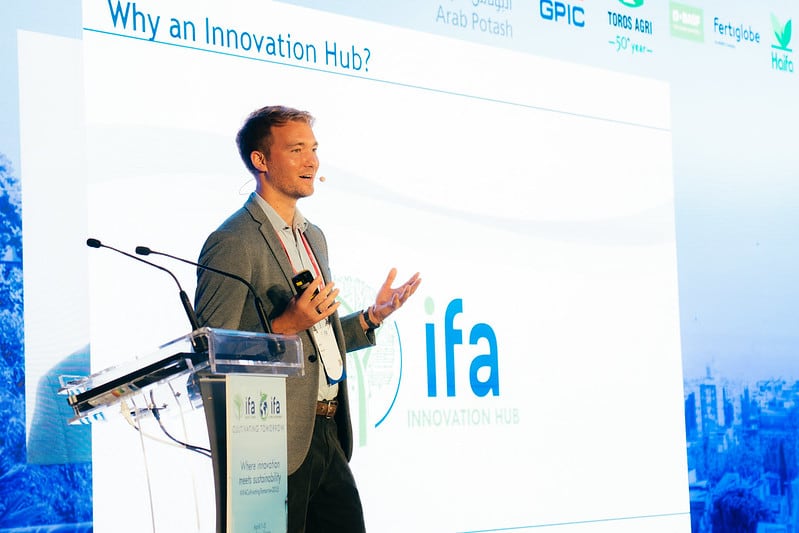The initiative, part of the IFA Innovation Hub launched earlier this year, aims to showcase the start-ups addressing critical challenges within the fertiliser value chain, such as the decarbonisation of ammonia and nitrogen fertiliser production, enhanced phosphorus use efficiency, and nutrient use efficiency tracking, along with a wildcard category for ‘out of the box’ innovation.
The finalists were selected from more than 100 applicants from more than 40 countries.
After pre-screening and due diligence by venture capital firm SVG Ventures, EIT Food, and IFA specialists, 33 semi-finalists were evaluated and the top 13 chosen for their groundbreaking approaches and scalable impact.
The finalists are
- Capsber (an Indian company developing advanced, nature-based biological solutions)
- Ficosterra (a Spanish marine biotechnology company that extracts bioactive compounds from marine seaweed)
- HydGene (an Australian start-up making green hydrogen production from agricultural and other biomass waste)
- LiveGrow Bio (a US company devloping microbial biopesticides and biostimulants)
- Marvin (An Israeli/Brazilian start-up that uses cutting-edge remote sensing, satellite imagery, AI and scientific research to make land management more transparent)
- MazaoHub (A Tanzanian firm helping smallholders improve farm productivity through AI and climate data)
- NitroCapt (A Swedish start-up devloping green nitrogen fertiliser using only air, water, and renewable energy as inputs)
- NitroVolt (A Danish start-up making decentralised ammonia production technology for agriculture, specifically a container-sized system that synthesizes green ammonia onsite at farms using only air, water, and renewable electricity)
- Paul-Tech (an Estonian company that provides real-time soil insights to help farmers and land managers optimise soil management and crop production)
- Peregrine Hydrogen (a US company developing a novel electrolyser technology that co-produces clean hydrogen and valuable commodity chemicals, targeting to replace fossil fuel-based hydrogen used especially in fertiliser production)
- Phospholutions (A US company developing innovative solutions to enhance the global use of phosphorus in agriculture)
- PlasmaLeap (an Australian start-up developing a first-of-its-kind, on-farm, ultra-low emission fertiliser production unit)
- Taxon (a US start-up combining expertise in microbial genomics, bioinformatics, and agricultural biotechnology to accelerate new bio-based product development for sustainable agriculture)
What’s next?
The finalists will get tailored business development programmes and full access to IFA’s global network, data resources and events, including presentations at the World Agri-tech Innovation Summit in London.
“These companies have been selected on weighted criteria tailored to the fertiliser industry, and those include opportunity to scale, business model feasibility, and sustainability impact,” explained Jack Keeys, the IFA’s Innovation Hub programme manager.
“Competition theme one, energy-efficient ammonia production, was particularly competitive with a diverse range of unique but strong innovations, and start-ups that are very well placed to decarbonize fertiliser production,” he told AgTechNavigator. “These include Peregrine, NitroCapt, NitroVolt, PlasmaLeap, HydGene.”
The ‘Wild Card’ entrants represent unique product and service innovations which may not have fit the competition themes but impressed the judges and warranted inclusion in the program, he added. “These include Livegrow, MazaoHub and Taxon, who are working on innovations ranging from microbial genomics and fermentation to AI-powered climate advisory.”

Industry parterships = start-up success
The challenge comes amid falling investment in the sector. The start-ups who present clear business models, credible science, and perhaps most importantly – seek to establish partnerships with the established industry early on – are the ones achieving the most success and find a much easier path to access capital, stressed Keeys.
“While the wider agtech ecosystem is still in an investing downturn, we believe the plant nutrition sector is positioned to maintain and grow its level of investment,” he told us.
“This is especially due to the strong engagement of the industry with several corporate venture capital arms and businesses engaging in innovation to support entrepreneurs, such as our strategic partners for this challenge.
He added: “We believe a combination of ambition and collaboration across the fertiliser industry towards the shared goal of feeding the world sustainably is the most important area of focus
“That way we can decarbonise, accelerate market entry times, and improve financial performance simultaneously.”





